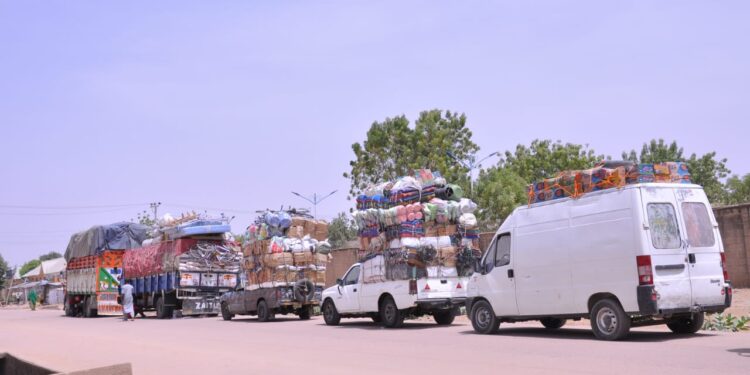Operatives from the Economic and Financial Crimes Commission (EFCC), Maiduguri Zonal Command, successfully intercepted 21 trucks loaded with food and various items bound for Ndjamena, Chad Republic; Central African Republic, and Cameroon on Tuesday, as shown in photos released by the EFCC. In an ongoing effort to tackle food inflation and address the rising cost of living, the Federal Government revealed that a total of 141 trucks attempting to smuggle grains and other essentials to Niger Republic, Chad, Cameroon, and the Central African Republic have been intercepted.
The Comptroller-General of the Nigeria Customs Service, Bashir Adeniyi, shared that within the past two weeks, approximately 120 trucks smuggling food items out of Nigeria were apprehended by Customs, while the EFCC thwarted the departure of 21 food-laden trucks on Tuesday. As these measures unfolded during a session at the House of Representatives in Abuja, truck drivers, facing attacks by criminals, threatened to initiate a strike if the situation persists.
Incidents of attacks on trucks and warehouses owned by private sector entities have escalated amid the country’s food inflation and cost of living crisis. The organized private sector expressed concern that these attacks could lead to widespread industrial shutdowns. In response, the Customs CG, Adeniyi, disclosed that President Bola Tinubu had directed the seized trucks to be redirected to local markets where they were intercepted, aiming to reduce the prices of grains and other food items in those areas.
Emphasizing the need for a long-term strategy to address food scarcity, Adeniyi cautioned against hasty solutions and highlighted the Customs’ role in ensuring food security. He also mentioned the temporary discontinuation of the public auction of seized grains, learning from a previous stampede incident in Lagos.
Meanwhile, the EFCC’s Maiduguri Zonal Command arrested 21 trucks loaded with food and non-food items destined for Ndjamena, Chad Republic; Central African Republic, and Cameroon. The Minister of Agriculture and Food Security, Abubakar Kyari, attributed the early onset of food scarcity to factors such as smuggling, flooding, the naira redesign policy, and the impact of the COVID-19 pandemic.
Truck owners, grappling with continuous attacks on their vehicles by hoodlums, warned that they might cease transporting food and fuel if the assaults persist. The National President of the Nigerian Association of Road Transport Owners, Yusuf Othman, stressed the urgent need for enhanced security on the roads to prevent further attacks, expressing concern that food scarcity could result if truck transportation is disrupted. Othman urged state governments to address these security concerns promptly to alleviate the suffering of citizens.
























